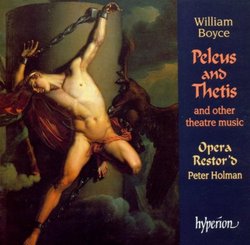| All Artists: William Boyce, Robin Blaze, Timothy Kenworthy-Brown, Opera Restor'd, Julia Gooding, Philippa Hyde, Joseph Cornwell, Christopher Lemmings, Jack Edwards, Jilly Bond Title: Boyce: Peleus and Thetis and Other Theatre Music (English Orpheus, Vol 41) /Opera Restor'd * Holman Members Wishing: 1 Total Copies: 0 Label: Hyperion UK Release Date: 6/10/1997 Album Type: Import Genres: Pop, Classical Styles: Vocal Pop, Opera & Classical Vocal, Historical Periods, Classical (c.1770-1830) Number of Discs: 1 SwapaCD Credits: 1 UPC: 034571169354 |
Search - William Boyce, Robin Blaze, Timothy Kenworthy-Brown :: Boyce: Peleus and Thetis and Other Theatre Music (English Orpheus, Vol 41) /Opera Restor'd * Holman
 | William Boyce, Robin Blaze, Timothy Kenworthy-Brown Boyce: Peleus and Thetis and Other Theatre Music (English Orpheus, Vol 41) /Opera Restor'd * Holman Genres: Pop, Classical |
Larger Image |
CD Details |
CD ReviewsA wanting glimpse into the world of English baroque . . . Dalua | the UK | 08/03/2003 (4 out of 5 stars) "William Boyce is probably best-known for his eight symphonies, but he wrote a fair amount of vocal music too - some of which is recorded here, and for the first time."Peleus and Thetis", masque or chamber opera, briefly relates the plight of a couple whose happiness is threatened by the unwanted attentions of Jupiter, king of the gods. The problem I have with this recording of Peleus & Thetis is the cast of soloists, especially Joseph Cornwell as Peleus. I suppose he sounds a little wet - or at best insincere - and his delivery of the recitatives is hammy. Julia Gooding does delivers Thetis satisfactorily, and more than that in places (though characteristically thin in others). Andrew Dale-Forbes' vibrato is awkward (and not true vibrato) and, instead of making a robust Jupiter, he sounds doddery. Robin Blaze is not a great countertenor - and, I may be wrong, but I think his part isn't even all that high.Peleus & Thetis may not be a dramatic masterpiece, and that is not the fault of the performers - but what they make of it is another matter: it is quite possible to transform average musical drama into a feast if one knows how - and these soloists, together or apart, do not manage this - a great pity because without hesitation I can that Boyce's setting more than lends itself to this end.The "Music for Florizel and Perdita" is unremarkable, in my opinion, and, though perhaps an interesting curiosity, serves mainly as a filler."Corydon and Miranda", however, is another story. Descriobed as a 'Pastoral Interlude', it is arguably the disc's strongest selling point. It relates a simple love triangle between the shepherd Corydon, and two shepherdesses, the faithful Miranda and the faithless Marcella. There is a reference to Philander, friend of Corydon, by whom Marcella has previously been courted - but whom she apparently cruelly spurned and who, in his despair, seems to have taken his own life. Miranda wishes to ensure that Corydon cannot - or will no longer - be seduced by Marcella and accuses him of being unfaithful to her. Marcella approaches, delivering a sensuous air, "The silver rain, the pearly dew". Corydon, who has protested his innocence, decides to demonstrate it by sending Marcella on her way in no uncertain terms. The brief rage aria that follows is brilliant - in her dismay, Marcella attempts to invoke the storm, to compliment her personal torment, her rage faltering for a moment when she asks that her 'dear charmer' be spared the wrath of the storm, and the next, showing herself as fickle as the English weather, she wishes full revenge on 'the wild inhuman swain'.The disc ends with a fine recording of the haunting dirge from a Drury Lane production of "Romeo and Juliet".I might well not give this recording four stars were it not for the fact that to date it's the only recording of these works of William Boyce. As I have said, I do have some misgivings - the main one being that I found Peleus & Thetis an unnecessary disappointment. But there is so little eighteenth century English vocal music represented on record that it would be a mistake to pass up the opportunity to familiarise oneself with it merely because it isn't as well-performed as one would hope."
|
